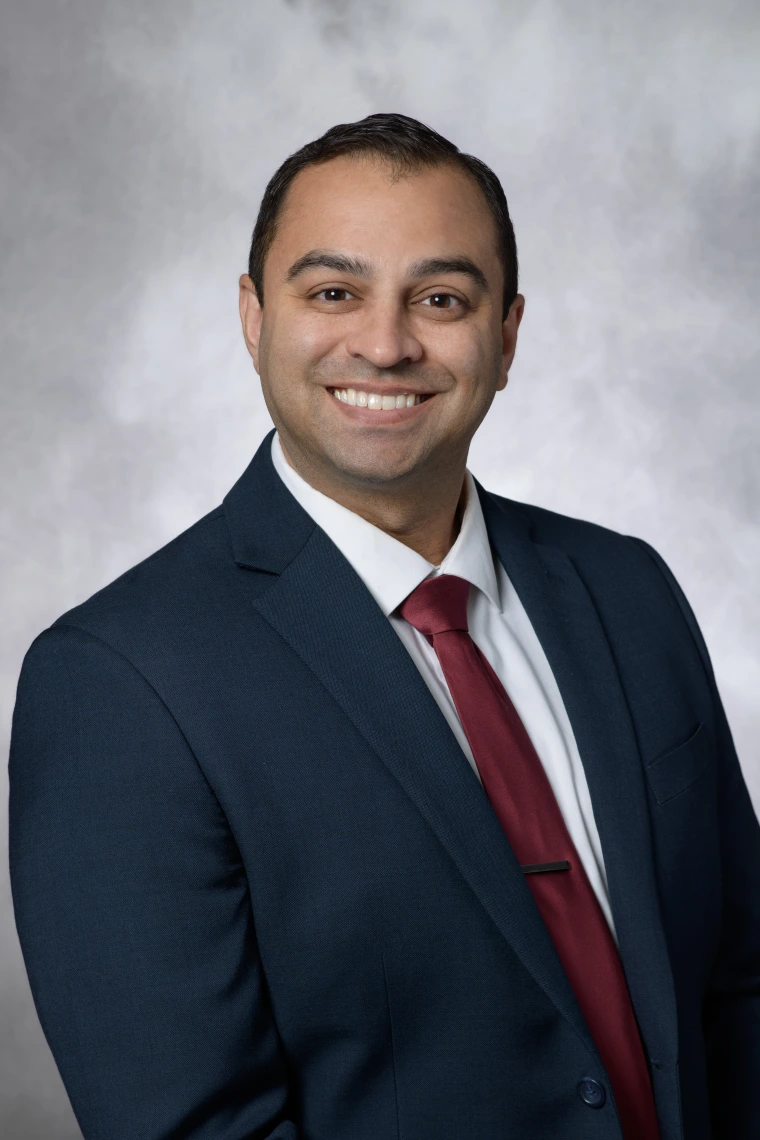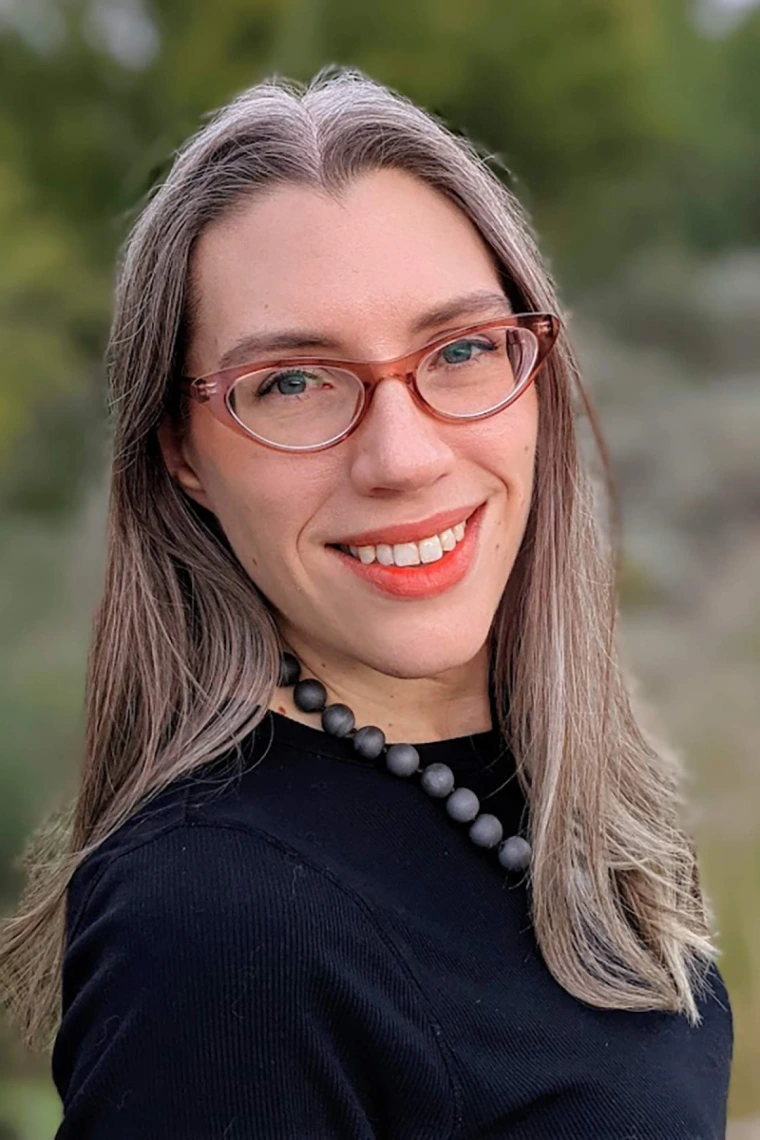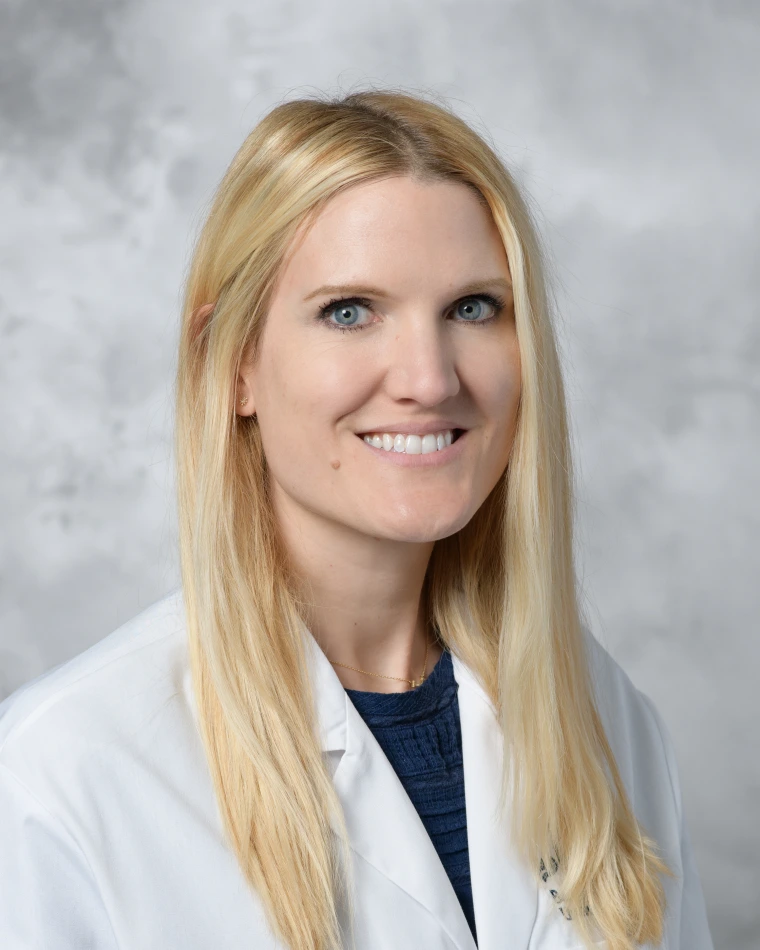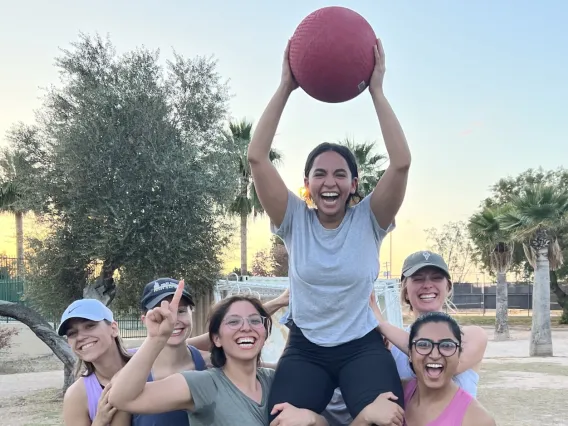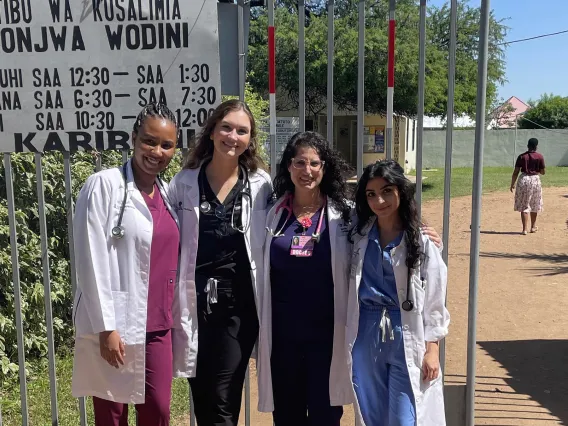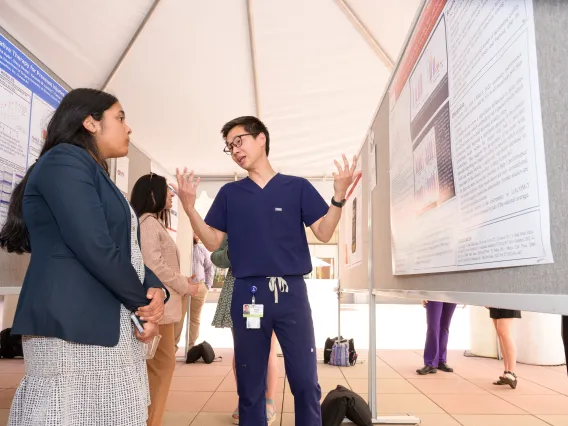Department of Medicine
General Internal Medicine, Geriatrics and Palliative Medicine
Fellowship Programs
The Division of General Internal Medicine, Geriatrics and Palliative Medicine offers two fellowship programs that prepare the next generation of specialty physicians.
The one-year ACGME-accredited Geriatric Medicine Fellowship offers outstanding clinical, research and learning experiences to physicians pursuing a career in geriatric medicine and related subfields.
The small size of the fellowship program provides a unique learning environment and promotes personalized, individual career development. Our nationally recognized faculty includes recipients of the John A. Hartford Geriatric Leadership Scholar Award and the Geriatric Academic Career Award. Our graduates successfully enter career paths in academic medicine, clinical care and geriatric program development. We are passionate about building and sustaining an inclusive team open to people from all backgrounds because we know diversity in experiences and perspectives is vital to advancing innovation and solving complex problems.
Physicians who have completed training in an accredited program in anesthesiology, internal medicine or family medicine are eligible to apply. The fellowship is administered through the Division of General Internal Medicine, Geriatrics & Palliative Medicine in the Department of Medicine at the University of Arizona College of Medicine – Tucson in partnership with the Southern Arizona VA Health Care System.
Fellows also are encouraged to pursue a Master in Public Health at the University of Arizona Mel & Enid Zuckerman College of Public Health.
The Geriatric Medicine Fellowship includes both continuous clinical activity and block rotations. Our curriculum emphasizes comprehensive interprofessional team care and innovative high-value models of geriatric care across the continuum of care offered.
Clinical Sites
Fellows rotate at the Southern Arizona VA Health Care System, Banner – University Medical Center Tucson and South campuses, community nursing homes and several other affiliated community sites. At all sites, fellows are supervised and mentored by a committed group of geriatric attending physicians.
Clinical activities include a weekly outpatient clinic, community nursing home long-term care, home-based primary care visits, weekly case conferences, grand rounds and journal clubs.
Block Rotations
Topic-focused block rotations usually last four weeks each. Subjects include:
- Overview of comprehensive geriatric assessment and care
- Hospice and palliative care
- Home-based primary care
- Subacute care
- Community geriatric practice
- Rheumatology and dermatology
- Geropsychiatry
- Neurogeriatrics
Opportunities are also available in older women’s health, medical director administrative and finance training, geriatric orthopedics and pain management.
Research Opportunities
Fellows interested in research design and development may pursue research projects under the supervision of faculty mentors.
Evaluation
The fellowship is evaluated regularly by fellows, faculty and others, and there is ongoing competency-based evaluation of both fellow and faculty performance in a supportive environment.
- Banner – University Medical Center Tucson, 1625 N. Campbell Ave., Tucson, AZ 85719
- Banner – University Medical Center South, 2800 E. Ajo Way Tucson, AZ 85714
- Banner – University Medicine North, 3838 N. Campbell Ave., Building 2, Tucson, AZ 85719
- Southern Arizona VA Health Care System, 3601 S. 6th Ave. Tucson, AZ 85723
| Tom Finkelstein, MD | 2025 | MD: Sackler School of Medicine, 2020 Residency: University of Arizona College of Medicine – Tucson, Internal Medicine |
| Samantha Russell, MD | 2024 | MD: University of Arizona College of Medicine – Tucson Residency: University of Arizona College of Medicine – Tucson, Internal Medicine |
| Kathryn Dowell, DO | 2023 | DO: University of North Texas Health Science Center at Fort Worth Residency: UT Tyler/CHRISTUS Good Shepherd, Longview, Internal Medicine |
| Theresa Day, MD | 2022 | MD: University of Arizona College of Medicine – Tucson Residency: University of California, San Francisco, Family Medicine |
| Jaclyn Robinson, MD | 2021 | MD: Ross University School of Medicine, Dominica Residency: Creighton University School of Medicine, Phoenix, Family Medicine |
Program Director
Physicians interested in the Geriatric Medicine Fellowship may apply through the Electronic Residency Application Service (ERAS) or the NRMP Fellowship Match of the National Resident Matching Program — see NRMP’s Medical Specialties Matching Program to apply for the University of Arizona Geriatric Medicine Fellowship Program. Qualifications for admission to the fellowship program include:
- The successful completion of a three-year residency in anesthesiology, family medicine or internal medicine
- U.S. citizenship, valid residency or J-1 visa
- Graduates of foreign medical schools must have a standard ECFMG Certificate
- All accepted candidate must obtain an Arizona postgraduate training permit (see Licensure)
You must apply through ERAS and register for participation in the match through the NRMP Fellowship Medical Specialties Matching Program.
Application Requirements
Your ERAS application will require the following documentation and should be uploaded here.
- CV
- Three letters of reference
- USMLE or COMLEX scores
- ECFMG certificate (see “International Medical Graduates,” below)
- Medical school transcript
- Certificate of completion (or good standing in) ACGME-accredited residency (can be in anesthesiology, family medicine or internal medicine).
- Personal statement
International Medical Graduates
Graduates of foreign medical schools are welcome to apply to the fellowship provided they have a standard ECFMG Certificate and an Arizona postgraduate training permit (see Licensure).
Fellows must either have U.S. citizenship, valid U.S. residency or a J-1 visa. H1-B visas are not supported by this fellowship.
Timeline and Deadlines
The program reviews all applications — from internal and external applicants alike — and selects the most qualified candidates for interviews. Interview season generally starts in mid-September and finishes in early November.
Important Timelines
ERAS
- June: Programs open for fellowship applicants (see the MyERAS® Fellowship User Guide)
- Mid-July: ERAS PostOffice opens to July cycle programs
- December: Match results available for July application cycle programs
NRMP
For key dates related to geriatric medicine programs in the NRMP Fellowship Match, see the NRMP Fellowship Medical Specialties Matching Program or click on its Fellowship Participants Match Calendar for match schedules.
A fellow accepts appointment as a clinical assistant in the program. It is understood that appointments at the University of Arizona College of Medicine – Tucson are year-to-year, and subject to annual renewal, pursuant to Chapter 4, University Handbook for Appointed Personnel and the Arizona Board of Regents Policy Manual, 6-301, et seq.
Thank you for your interest in our Hospice and Palliative Medicine Fellowship, which is grounded in the belief that excellent clinical training and deep human connection go hand in hand. We are proud to offer a rich, supportive and intellectually stimulating environment where fellows are encouraged to bring their full selves to the practice of medicine — and to their own professional development.
Fellows learn alongside a diverse and deeply committed team in settings that span a major academic medical center, a thriving VA system, and exceptional community hospitals and hospice agencies. Our program emphasizes thoughtful mentorship, a culture of reflection, and a genuine commitment to the well-being of our patients, their families and each other.
We are proud to call Tucson home. Nestled in the Sonoran Desert and ringed by five mountain ranges, Tucson offers more than 300 days of sunshine each year, with endless opportunities for outdoor adventure — from hiking and biking to birding and stargazing. Named a UNESCO City of Gastronomy, Tucson is a city where vibrant culture meets natural beauty, where community feels close-knit and welcoming, and where our fellows find space to recharge, connect and thrive.
Because we train one fellow per year, we can tailor education to meet our fellow’s individual needs. We strive to create a learning culture that is deeply human, growth is truly supported.
We are excited for you to learn more about our program and encourage you to reach out to us directly for additional information or questions.
Our curriculum is carefully crafted to offer both depth and breadth in hospice and palliative care, with immersive clinical experiences and protected educational time that support the growth of well-rounded, reflective physicians.
We offer
- 12-month ACGME accredited Hospice and Palliative Medicine Fellowship
- Exposure to inpatient and ambulatory academic, community and VA settings
- All graduates of our program who demonstrate competence in the six ACGME Core Competencies will be eligible to sit for board certification in hospice and palliative medicine
One of the most powerful aspects of our fellowship is the variety of the people we serve. Fellows care for patients across the lifespan and from all walks of life — reflecting a wide range of backgrounds, languages and life experiences. Our clinical settings offer exposure to complex and serious illness and working with the social and structural challenges that shape health. This breadth ensures our fellows gain exceptional clinical training in both symptom management and communication.
12-month Clinical Curriculum
- Banner – University Medical Center Tucson Inpatient Palliative Consult Service: 5 months
- Tucson Medical Center Hospice (Peppi’s House): 6 weeks
- VA Consult Service and Community Living Center (CLC): 2 months
- VA Home Based Primary Care: 1 month
- Psychospiritual Care: 2 weeks
- Procedural and Interventional Pain Services (PIPS): 3 weeks
- Radiation Oncology
- Pain Anesthesia
- Interventional Radiology
- Electives: 4 weeks
- Pediatric Palliative Care Clinic: Half Day/Month
- University of Arizona Cancer Center Supportive & Palliative Care Clinic: Half Day/Week
Educational Curriculum
Fellows have carved-out and protected didactics weekly with the Tucson Palliative and Hospice Community with a home at Banner – University Medical Center. Didactic topics vary widely and include previous sessions such as:
- Art museum-based palliative medical education
- Anorexia and cachexia
- Intro to ventricular assist devices
- Mindfulness strategies
- Psycho-oncology
- Ethics of medical assistance in dying
- Radiation oncology for the palliative clinician
- Methadone for cancer-related pain
- Prognostication
- Burnout and wellness
Fellows will:
- Lead journal clubs
- Conduct their own QI or Scholarly Project over the year with a final presentation
- Engage in difficult case discussions
- Present a formal didactic on a topic of choice
Optional Opportunities
- Participate in communication curriculum using simulation and the sim lab
- Attend VitalTalk
- Attend national conference/meetings with available supportive funds
- Complete the integrative medicine curriculum through Andrew Weil Center
- Engage and network in Phoenix Consortium Communication Curriculum
- Attend monthly ethics meetings
- Lead resident and medical student informal bedside education and formal didactic sessions
- Banner – University Medical Center Tucson
- University of Arizona Cancer Center
- Southern Arizona Veteran Affairs
- Hospice
- CLC
- Tucson Medical Center
- Peppi’s House (Hospice)
- Tucson Medical Center Inpatient
- Children’s Clinics for Rehabilitative Services
| Samantha Russell, MD | 2025 |
| Tom Finkelstein, MD | 2024 |
| Jennifer Plitt, MD | 2023 |
| Hillary Goldstein, MD | 2022 |
| Eric Kadlec, MD | 2021 |
| Tiffany Ynosencio, MD | 2020 |
| David Horn, MD | 2019 |
| Muna Omar, MBBS | 2018 |
| Bianca Zangeneh, MD | 2017 |
| Michael Debo, DO | 2016 |
| Katherine Hawbaker, MD | 2016 |
| Pavan Parashar, MD | 2015 |
| Jennifer Gabbard, MD | 2014 |
| Michelle Rhodes, MD | 2014 |
| Jeffrey Richmond, MD | 2012 |
| Macy Whitley, DO | 2012 |
Program Director
Associate Program Director
We welcome one fellow per year from the following co-sponsoring board specialties:
- Internal Medicine
- Family Medicine
- Emergency Medicine
- Anesthesiology
- Neurology
- Psychiatry
- Surgery
- Physical Medicine and Rehabilitation
- Obstetrics & Gynecology
- Radiology
To be eligible for the Hospice and Palliative Medicine Fellowship, you must have completed or be participating in an Accreditation Council for Graduate Medical Education (ACGME)-accredited or Royal College of Physicians and Surgeons of Canada (RCPSC)-accredited residency program.
Applicants must be legally able to work in the U.S. or eligible to obtain work authorization. All accepted candidates must obtain an Arizona medical license.
Apply through Electronic Residency Application Service (ERAS)
- CV
- Personal Statement
- Medical School Transcript
- USMLE or COMLEX Scores
- We ask for three letters of recommendation
- Please include a letter from your residency program director
- If you graduated from residency more than five years ago, in lieu of a program director letter, please include a letter from your current supervisor
- We encourage you to include a letter from a hospice or palliative care interdisciplinary team member if available
- We encourage you to ask for your letter writers to speak to your professionalism, work ethic, communication skills, patient care and interprofessional skills
- Applications completed by July 31 are given priority
- Virtual interview invitations are sent out starting in August, and interviews are scheduled from the beginning of September through the end of October
- We participate in the Hospice and Palliative Medicine Match, included under the Medical Specialties Matching Program, which is sponsored by the National Resident Matching Program (NRMP)
Training in Tucson
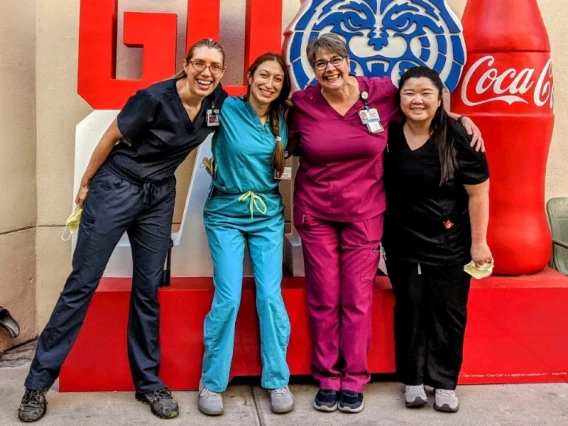
Learn more about the residency and fellowship programs at the College of Medicine – Tucson.

Applications are listed as the University of Arizona Program for the July application cycle.
Robin M. Lang
Program Coordinator, Geriatrics Medicine Fellowship and Hospice & Palliative Medicine Fellowship
robinlang@arizona.edu



![[Meenakshi Dagar, MD]](/sites/default/files/styles/az_medium/public/2025-06/Dagar-Meenakshi-MD_GGP_BH-IMG-20250604-WA0000_5x7.jpg.webp?itok=olJAd2gV)
